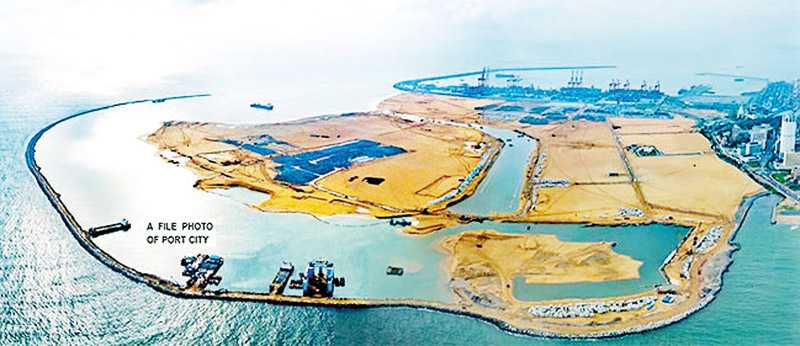Friday Apr 18, 2025
Friday Apr 18, 2025
Friday, 30 April 2021 01:02 - - {{hitsCtrl.values.hits}}

In the ongoing debates on the question of the Colombo Port City, while politics seem to dominate economics, in my opinion, it should be the other way around. This does not mean that politics always should follow economics, but it should be a major concern in particularly in a developing country like Sri Lanka
 Why oppose the Colombo Port City or the Bill? Some may oppose because it is a Rajapaksa initiative. If it were a UNP or a SJB one, it would have been perfectly acceptable to them! Quite strangely, even the JVP leaders might be thinking in that direction. The role of the opposition in a democratic society is completely misunderstood or turned upside down.
Why oppose the Colombo Port City or the Bill? Some may oppose because it is a Rajapaksa initiative. If it were a UNP or a SJB one, it would have been perfectly acceptable to them! Quite strangely, even the JVP leaders might be thinking in that direction. The role of the opposition in a democratic society is completely misunderstood or turned upside down.
Some others may oppose because, arguably, it is against the country’s or people’s sovereignty. This may appear a reasonable assumption at least on the surface. However, the argument mainly comes from those who neglect or go against ‘sovereignty’ usually on behalf of foreign sources or forces.
If there are inconsistencies between the Bill and the Constitution, that should be left to the Supreme Court to decide, while expressing one’s views is perfectly acceptable. Our Constitution is 43 years old with contradictory 20 amendments back and forth. Therefore, obviously there can be inconsistencies. Or even otherwise, there can be inconsistencies based on the so far accepted notions of democracy.
There are others who oppose the Port City or the Bill because of its China connection. They are basically, ultranationalists or Western aliened so-called liberals. This amalgamation is utterly strange. Among them are some hopeless leftists as well. Although they verbally talk about socialism (at least rarely), their primary contemporary concerns are purely constitutThe concept of the Port City
ional law or political neoliberalism. Imbibed in Western cultural notions, they perhaps have some antipathy towards Chinese culture, language or even the people.
The background
On 8 April, the Bill was presented to Parliament after the approval by the Cabinet and gazetted on 24 March. Within seven days it was challenged by 19 petitioners before the Supreme Court, and the government side has also submitted 13 petitions in support of the Bill. Soon we will have the Supreme Court verdict.
This 74-page gazette is prized only Rs. 112, less than half a dollar in the black market. The reason why I make this digression is to emphasise the need to rationalise the State sector, and in this case the Government Printers. Those who buy copies of gazettes are not the poor people, but the lawyers, Members of Parliament, businessmen and administrators. They can undoubtedly afford a higher price to cover the costs.
In the ongoing debates on the question of the Colombo Port City, while politics seem to dominate economics, in my opinion, it should be the other way around. This does not mean that politics always should follow economics, but it should be a major concern in particularly in a developing country like Sri Lanka.
Sri Lanka is still a lower-middle-income country with a per capita GDP of around $ 4,000. The population is nearly 21.8 million and the size of the economy is around $ 87 billion GDP. This is before the pandemic. Sri Lankan economy has contracted by 3.6% in 2020. We are now smaller in size, other than facing considerable difficulties in day-to-day life.
During the bad days of COVID-19 pandemic the revenue contracted, and the expenditure expanded with the fiscal deficit increasing. The public debt increased to 109.7% of the GDP, accumulating the delayed payments into it. There were concessions given to the businesses, like in many other countries, including tax moratoriums on debt payments.
There were some praises from the World Bank on fiscal and other economic policies of the country. “An improved trade balance and strong remittance inflows narrowed the current account deficit. A sharp drop in imports in 2020 more than offset the decline in exports,” they said. Imports dropped with some measures to restrict some nonessentials.
Some of the ‘open, open, and open policies’ were changed on a pragmatic basis. There was no much grumble from the people. Of course, the financial inflows were insufficient to meet external liabilities. The external reserves dropped. Last month, however, through a currency swap with the People’s Bank of China worth $ 1.5 billion the external reserves are again strengthened.
Sri Lanka is now again facing a third wave of the COVID pandemic and the people and the political parties should be able to cooperate in resolving the attended problems before the situation gets worse and worse.
The concept of the Port City
A Colombo port city is not completely a new concept. Colombo Fort was in fact a port city. However, the new concept came in 2011 with the building of the Colombo South Port. The reclamation of land around 660 acres for this purpose was given to the China Harbor Engineering Company (CHEC) and the work was completed by early 2018 for a cost of $ 15 billion. This is not a small amount. Therefore, the project should be cost effective, if not immediately, in the medium term.
Both the last two Governments had commitments for the project with differences. The idea of the last Government (2015-2020) was to consider it a part of the Megapolis and the city area as an International Financial Centre. It was considered as part of the Colombo District with all the attached legal conditions. The present project and the presented Bill probably have gone back to the initial idea while expanding on it. Thus, the Port City is a special area with a special administration for broad economic purposes.
There is a new book published recently edited by Chulannee Attanayake, with 15 contributors, local and foreign, titled ‘Maritime Sri Lanka: Historical and Contemporary Perspectives’. The book advocates the idea that Sri Lanka is not just a South Asian country but an Indian Ocean country.
It goes to say: “The idea of being an Indian Ocean state is reflected in how Sri Lanka wants to promote itself as the centre of the Indian Ocean. Soon after the end of the conflict, the then Government of Sri Lanka emphasised its interest in making Sri Lanka the naval, air and commercial hub in the Indian Ocean. The manifesto Mahinda Rajapaksa presented for the election held soon after the end of the war emphasised on using the country’s strategic geographical location in transforming Sri Lanka into a naval, aviation, commercial, energy and knowledge hub to serve as a link between the East and the West.”
The idea of a link between the East and the West has further merit in philosophical, social, and conceptual sense as well, although that aspect is not discussed in this article. Apart from that the Editor says: “The Sirisena-Wickremesinghe Government that came to power in 2015 continued the same ideology,” correct or not.
She also quotes the former Minister of Foreign Affairs Mangala Samaraweera saying: “Reclaiming our Indian Ocean identity helps us and others unlock the tremendous opportunities for attracting FDI, accessing markets and developing the tourism industry.”
Conclusion
The three main objectives of the proposed Bill are (1) to establish the Colombo Port City (CPC) formally, (2) to create a Special Economic Zone (SEZ) within it, and (3) to set up an Economic Commission (EC) to manage it appointed by the President. It is important that the Bill derives its authority and purpose through the ‘Directive Principles of State Policy’ enshrined in the Constitution as an obligation of the State to ensure the rapid development of the country through public and private entrepreneurial activities.
The Special Economic Zone is defined in the Bill as “an international business and services hub with specialized infrastructure and other facilities within such Zone, for the promotion and facilitation of economic activity including international trade, shipping logistic operations, offshore banking and financial services, information technology and business process outsourcing, corporate headquarters operations, regional distribution operations, tourism, and other ancillary services.”
The Economic Commission is empowered “with the administration, regulation and control of, all matters connected with businesses and other operations, in and from the Area of Authority” of the Colombo Port City which is also the Special Economic Zone.
The above may appear quite uncontroversial. But the devil must be in the details. These are the details that must be interpreted and determined by the Supreme Court.
The Colombo Port City is not going to be an isolated economic zone. It is related to the ‘Belt and Road Initiative’ (BRI) initiated by China. That is the strength, and in some people’s opinion the unacceptability. The people and the parliamentarians must make a choice between the declining West (particularly the US) and the rising East (particularly China) in supporting or opposing this initiative.
In my opinion, there is nothing wrong in The Democratic Socialist Republic of Sri Lanka having an alliance with The ‘People’s Republic of China. Before all that, the country may have to get the COVID pandemic decisively under control.
Discover Kapruka, the leading online shopping platform in Sri Lanka, where you can conveniently send Gifts and Flowers to your loved ones for any event including Valentine ’s Day. Explore a wide range of popular Shopping Categories on Kapruka, including Toys, Groceries, Electronics, Birthday Cakes, Fruits, Chocolates, Flower Bouquets, Clothing, Watches, Lingerie, Gift Sets and Jewellery. Also if you’re interested in selling with Kapruka, Partner Central by Kapruka is the best solution to start with. Moreover, through Kapruka Global Shop, you can also enjoy the convenience of purchasing products from renowned platforms like Amazon and eBay and have them delivered to Sri Lanka.
Discover Kapruka, the leading online shopping platform in Sri Lanka, where you can conveniently send Gifts and Flowers to your loved ones for any event including Valentine ’s Day. Explore a wide range of popular Shopping Categories on Kapruka, including Toys, Groceries, Electronics, Birthday Cakes, Fruits, Chocolates, Flower Bouquets, Clothing, Watches, Lingerie, Gift Sets and Jewellery. Also if you’re interested in selling with Kapruka, Partner Central by Kapruka is the best solution to start with. Moreover, through Kapruka Global Shop, you can also enjoy the convenience of purchasing products from renowned platforms like Amazon and eBay and have them delivered to Sri Lanka.